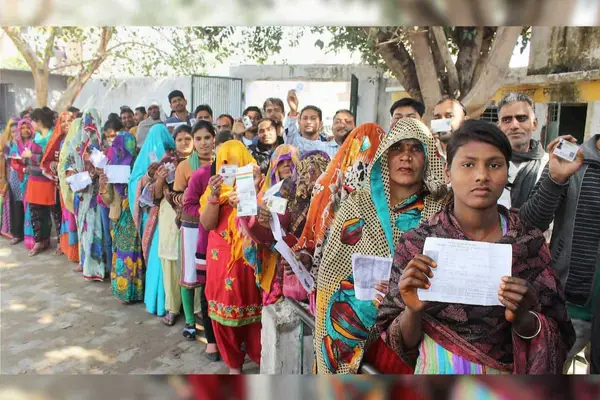The Model Code of Conduct (MCC) recently came into force with the announcement of voting dates today by the Election Commission of India (ECI).
What is the Model Code of Conduct (MCC)?
- MCC is a set of guidelines published by the Election Commission of India (ECI) for political parties and candidates to set standards of conduct during the election campaign and polling.
- It explains the procedure for parties to lodge complaints to the EC observers in case of dispute and instructs in the conduct of Ministers and candidates when MCC is in force.
- In 2019, a new addition regarding election manifestos was added, instructing parties to not issue promises which were ‘repugnant to the ideals of the Constitution’.
- The MCC is not a statutory document, so is not enforceable by any laws passed by the Parliament.
- But the violation of many of its guidelines may not attract punitive action.
- The MCC comes into force immediately when the election schedule is announced by the ECI and remains in operation till the election process is complete– results are announced.
- It applies to all elections to the Lok Sabha, State Assemblies, State Legislative Council elections from Local Bodies, and Graduates’ and Teachers’ Constituencies.
- It is enforced throughout India in case of General elections, and the State up for polls in case of Legislative Assembly elections.
- All organisations, committees, corporations, commissions (Transport authorities, Jal boards) funded wholly or partially by the Centre or State are bound by the MCC.
- While listed political parties and candidates are bound to follow the MCC, even non-political organizations that hold campaigns in favor are bound to follow specific guidelines.
How is the MCC enforced?
- Before holding polls for the General or State Assembly elections, the ECI issues guidelines to the government to shift all officers including police who are posted in their home district.
- Those who have completed three out of four years in that district to ensure no interference.
- The MCC is then implemented by the newly appointed officials and nodal EC officers monitor compliance.
- No election campaigning is allowed within the constituency 48 hours before the close of polls.
What are the guidelines for parties and candidates?
- Political parties and candidates shall refrain from commenting on private life of the leaders, and workers of other parties.
- This limits criticisms to only their policies, programmes, records, and works.
- Social media posts must also refrain from insulting rivals.
- They must also not indulge in activities aggravating existing differences or create mutual hatred between different castes, and religious and linguistic communities.
- Appeals to caste or communal feelings for securing votes are also prohibited.
- Restrictive or prohibitory orders in force at any public place where meetings are held must be adhered to.
- Permission for usage of public spaces and loudspeakers must be taken from local police.
- In case of a public procession, details of time and place of start and end point and the route to be followed must be informed and cleared by the police.
- All political workers engaged in electioneering must display badges or identity cards and leave the constituency after the campaign period is over.
- Disrupting public meetings of other parties or candidates are also prohibited.
- Parties cannot hold processions along places where other parties are holding meetings or remove/ deface rival parties’ posters.
- No political party can make any payment over ₹10,000 in cash, in a day, to any person/company/entity.
- Parties must also not resort to bribing/intimidating/impersonating voters.
- Canvassing within 100 metres of polling booths is not allowed and demonstrations before house of any individual should not be resorted to.
- Posters, flags, symbols, or any other propaganda material shall not be displayed at the polling place.
- Loudspeakers cannot be used between 10 p.m. and 6 a.m. unless written permission of local authorities is taken.
- Election Manifestos must not contain anything repugnant to the ideals enshrined in the Constitution.
- They must reflect the rationale for welfare scheme promises and indicate ways to meet the financial requirements for it.
Guidelines for governments:
- The Union Ministries will need prior approval of the EC on any policy announcements, fiscal measures, taxation issues, financial reliefs when the MCC is in force.
- These ministries cannot directly refer to the EC and must do it via the Cabinet Secretariat.
- Similar guidelines apply to State governments where proposals must be referred to a screening committee which would forward them to the Chief Electoral Officers.
- Ministers and authorities shall not announce financial grants, lay foundation stones of projects or schemes when MCC is in force.
- They must also not make promises of construction of roads, provision of drinking water facilities, etc. to influence voters in favour of the party in power.
- They cannot sanction grants/payments out of discretionary funds – funds generically sanctioned in the budget before MCC’s enforcement.
- Official visits cannot be combined with electioneering work and no official machinery, vehicles, guest houses or personnel can be used for campaigning.
- In an election year, the Union government cannot present a full Budget as there may be a change in the ruling government in power, after the polls.
- Under the MCC, the government is not allowed to announce any major scheme that could influence voters or present an Economic Survey in the interim budget.
- Tax revision and vote on account which includes presenting its fund requirement for salaries, ongoing projects, and other expenditures for the transitional period are allowed.
- Ad-hoc appointments of officers are prohibited and sometimes even regular appointments based on due selection by statutory bodies may be deferred.
Ref:Source
| UPSC IAS Preparation Resources | |
| Current Affairs Analysis | Topperspedia |
| GS Shots | Simply Explained |
| Daily Flash Cards | Daily Quiz |


